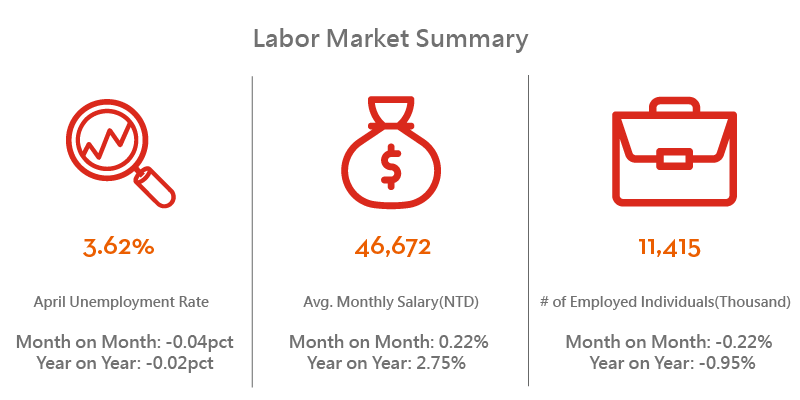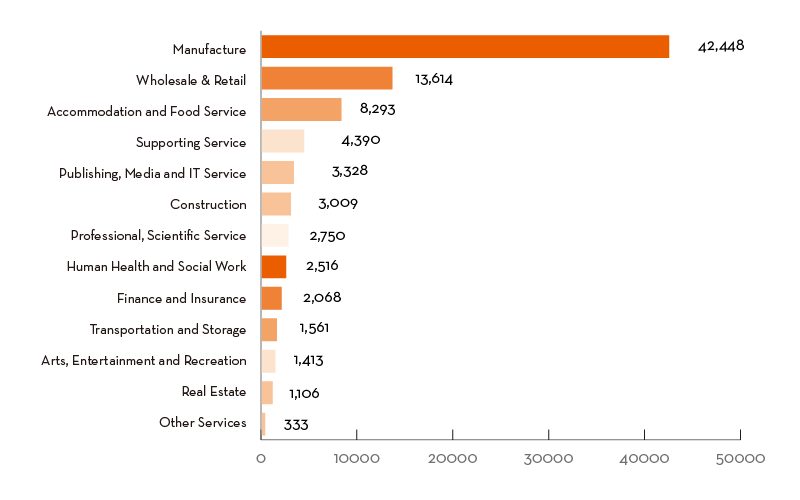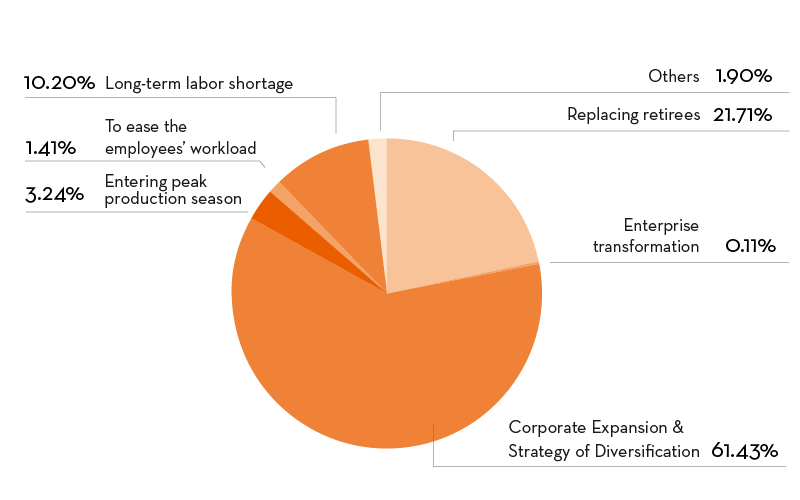
2022 – Q3 Job Market Update (English)


Labor Market Summary
According to the report presented by the Directorate General of Budget, Accounting & Statistics, Executive Yuan, Taiwan’s real gross domestic product (GDP) in 2022 Q1 grew by 3.14% on a year-on-year basis; this was driven by the continued demand for innovative technology applications and alleviation of material shortage within the supply chain. Due to constantly emerging new technological applications, the growing demands from enterprises’ digital transformation, and the infrastructure implemented by governments, the real GDP is projected to grow by 3.91% in 2022.
On the domestic demand side, the revenue in retail and in the food and beverage segment has had an annual growth of 4.10% and 4.98% individually in 2022 Q1. This mainly reflects the continuous growth of e-commerce, the easing of Covid-19 pandemic prevention policy, and government stimulus packages. In contrast, affected by the weather and pandemic, the consumption of transportation and of leisure and entertainment-related services is still weak; for instance, the number of passengers carried by public transportation has decreased by 10%.
Net increase or decrease in manpower demand at the end of July 2022 compared to the end of April: according to industry demand

Source: The second survey of manpower needs by the Ministry of Labor in 2022
According to data released by the Ministry of Labor, with the prospect of increasing demands from the global market, Taiwan’s adoption of pandemic prevention measures and economic development in parallel, and optimism about tourism business opportunities in the peak summer season, it is estimated that between the end of April 2022 and the end of July 2022, manpower demand will increase by 87,000 persons. Industries with the highest workforce demand are still predominately in manufacturing, with a net increase in demand of 42,000 persons; this is mainly due to the increase in demand are the expansion or diversification of operations (59.6%). The wholesale and retail segment, and the accommodation and catering segment, are expected to have a net increase in manpower demand of 22,000 people during the peak tourism season.
Reasons for the increase in manpower at the end of July 2022 compared to the end of April

Source: The second survey of manpower needs by the Ministry of Labor in 2022
Compared with the previous year, the unemployment rate declined by 0.02 percentage points in April 2022, and the seasonally adjusted unemployment rate is 3.62%. The average salary for the month was NT$46,672, which increased by 2.75% more than the same month last year. The number of unemployed persons was 430,000 in April 2022, with the highest unemployment rate seen in the 20–24 age bracket, accounting for 12.26%. The main reasons are that people in this group are in the initial job search stage and are adapting to the workplace.
Enterprise recruitment needs more flexibility and cross-field talents to create new possibilities
In the first half of 2022, although major environmental changes (such as the occurrence of wars and price inflation) failed to have a significant impact on the labor market, Taiwan was facing a severe pandemic in Q2, which still affected the service and food and beverage segments. However, compared with the severe period of the pandemic in 2021, this year, countries around the world are implementing policies to coexist with Covid-19, and easing border quarantine. Along with the optimistic market demands, these factors are expected to drive the manpower demand of various segments in Q3.
From the perspective of employee supply, the talent shortage continues, due to the impact of the low birthrate, and the young generation choosing to continue their studies after graduation rather than immediately entering the job market. At the same time, job seekers are gradually paying more attention to the work–life balance; they are tending to choose jobs that can maintain the quality of life, rather than those requiring shifts and overtime, which results in an increasing turnover rate in the semiconductor manufacturing segment.
With the existing talent shortage situation, companies need to be more flexible and fast in the recruitment process, otherwise they will take a long time to find these candidates. In order to attract skilled employees, enterprises need to provide a more competitive salary, benefits, and a friendly self-development environment for employees.
At the same time, during recruitment, the supervisors need to have an open mind to accept applicants with different industry backgrounds, and flexibly adjust the criteria of candidates’ qualifications. For example, when looking for talents in emerging industries such as blockchain, in addition to candidates within the industry, companies can also seek those from other industries who have the same tool development experience or similar skills application experience. In addition to focusing on the if the talents get into the swing, companies can also give new recruits the opportunity to become new team members through internal training.
Furthermore, as the hybrid remote workstyle is the future trend, companies should think about how to balance the work-loading arrangement of working from home and in-house, to attract more talents from different regions and countries.
Enterprises will also begin to review whether the increased salary and benefits, which enhance the competitiveness of recruitment, positively lead to better employee performance. For example, can the remote and hybrid work patterns established during the pandemic really improve employee productivity and performance? Which jobs are suitable for remote or hybrid workstyles? Companies can use digital platforms or systems to evaluate the performance of new workstyles.
From the perspective of the temporary manpower market, due to the pandemic and digital transformation, enterprises need more flexibility in workforce arrangement, to drive the growth of the demand for contractors and temporary staff. Such needs arise mainly in the technology and medicine industries, and also from food and beverages, or logistics. Thus, the construction industry is in urgent need of new-generation talents, but the supply of manpower is still relatively low. When an enterprise hires temporary staff, or when talents consider dispatching openings, both parties need to accelerate the decision time, otherwise the candidates and good opportunities may be missed.
New generations of job seekers need to cultivate more professional skills and soft power
Due to the fierce competition in the job market, this year is still a good time to change jobs. Especially for experienced talents, most of the preliminary interviews are still conducted online. Thus, job seekers can approach new opportunities with an open attitude and gain some advantages.
To cope with the rapid changes in the global market, job seekers not only need to strengthen their professional functions, but also to cultivate soft power, such as having a global view, working flexibility in different places, and self-management, communication and collaboration skills, etc., to enhance their competitiveness in the workplace. For young job seekers, besides evaluating their job selection based on salary, it is recommended that they focus on the long-term industry development. To persist in accumulating qualifications in professional fields is better for their long-term career development.
Taking the software segment as an example: because large companies rarely expand their teams, software engineers should seize these opportunities and aggressively apply for the job offerings. Joining a new product development team at an early stage can improve candidates’ opportunities to become a new project leader in the future.
International talent flow promotes a win-win situation for both enterprises and talents
Not only Taiwanese job seekers, but also many from other Asian countries, such as India, Malaysia, and the Philippines, are attracted by career development in Taiwan. After the Covid-19 pandemic, many Taiwanese talents who may not have been willing to relocate to Southeast Asia in the past have begun to consider working overseas. At the same time, Adecco also observed that some companies are looking for skilled employees from Malaysia, the Philippines, and Indonesia; mainly because the Taiwanese managers who have been dispatched in the past 20 years are about to retire, and need a successor to take over.
Industry Outlook
Finance and Banking
Due to the outbreak of the pandemic in April and May, and the foreign finance and banking companies deferring granting bonuses to Q2, the middle- and high-level labor market did not rebound significantly in Q2. At present, the recruitment of traditional accounting positions (IPO, food and beverage, retail) has slowed down or been suspended, due to the pandemic resulting in decreased revenue. Companies are also concerned about the effects of inflation and interest rate adjustments, so they become conservative in their manpower demands. The major workforce needs come from the manufacturing, semiconductor, software, emerging technology and digital industries. It is expected that in Q3, with the easing of the epidemic, revenue will become stable, and recruitment will gradually increase.
Also affected by Covid-19, the recruitment by many Taiwanese financial companies in Q2 has also been delayed, but it is expected to return to normality, with new positions released in Q3. At present, in addition to job openings in the traditional main core business, others come from the digital-related segment and the emerging technology applications.
Administration and human resource management:
Although the epidemic situation continues, Taiwan’s domestic enterprises have gradually returned to their normal workstyle or introduced a new hybrid workstyle. The logistics personnel and administrative personnel have come back to office, and they are facing the challenge of talent recruitment due to lack of manpower.
The demand for professionals in property management and the introduction of cross-disciplinary human resources systems is soaring. However, the workforce shortage for training and remote performance management courses is also increasing. These are the trends seen in the first half of 2022.
Due to the slow pace of internal employee transformation, many Taiwanese companies have insufficient adaptability in competing for talent. For instance, many employees over the age of 30, who are more familiar with the application of digital tools, have left these firms.
Legal and Compliance:
The overall demand for legal and compliance professionals is still high, and is increasing significantly in the e-commerce (e-payment and e-tickets), fintech, and blockchain sectors. In addition, due to many enterprises moving toward digital transformation, there is an increasing demand for talents who are familiar with technology regulations, international financial transactions, personal information protection, and overseas legal research.
Job seekers may find that the market for legal talents is becoming more competitive. Many students are moving back to Taiwan to seek employment, after completing their LLM (Master of Laws) abroad. Moreover, those candidates who currently act as middle- and high-level legal supervisors in overseas companies, are also considering returning to Taiwan.
In terms of working style, legal and compliance professionals prefer flexible working hours, and may choose to work as a contractor or through self-employment. Some companies are also offering a hybrid work-from-home model after the pandemic.
In the first half of the year, the demand for legal compliance and anti-money laundering measures increased, due to the return of “hot money” to Taiwan. Moreover, the technology manufacturing segment has also begun to look for risk management and legal compliance talents.
Sales and Marketing:
Affected by the Covid-19 pandemic, companies were unable to participate in physical exhibitions around the world; hence, the demand for digital marketing talents has also boomed. However, regarding sales vacancies, the demand for sales and key account management has declined.
Retail:
E-commerce, driven by the stay-at-home economy, has become part of the new norm. Even if the pandemic situation is stabilizing and pandemic measures are being eased, e-commerce will still accelerate growth of the retail industry in the future. The physical retail sector is more aggressively opting for digital transformation and the expansion of online channels. Therefore, companies need to recruit employees who can provide system and technical support.
From the perspective of the job market in northern, middle and southern Taiwan, the manpower demand in the retail industry is generally available, and this is expected to continue in Q3. For instance, retailers in southern Taiwan are raising wages, in the hope of attracting talents from middle Taiwan.
Hospitality:
In general, due to the severe pandemic in Taiwan in Q2, the food and beverage service segment and the hospitality segment were sluggish, and the demand for manpower stagnated. However, with the implementation of the unease of border quarantine policy, the overall demand is expected to increase in Q3, and the tourism industry is foreseen to improve.
Merchandising and Logistics:
The Covid-19 epidemic has driven changes in consumer behaviors, and the consumption patterns in bricks-and-mortar stores have gradually shifted to more convenient and contact-free e-commerce services. Major e-commerce and wholesale retailers continue to expand their main warehouses and satellite warehouses in various regions, and to integrate logistics. In addition to establishing their own fleets, they also actively cooperate with major logistics companies and delivery service providers.
Those candidates with good inter-departmental communication skills, experience of order system docking, cross-functional skills in the consumer industry, and integrated management capabilities, are all key targets for companies’ recruitment.
Pharmaceuticals and Healthcare:
Due to the healthy market prospects and stable global orders for Taiwan’s medical and biotechnology industry, it is foreseeable that the demand for talents in international business development will continue to grow in Q3. In addition, the vigorous development of Indian pharmaceutical companies, coupled with the market potential in Southeast Asia and the ASEAN countries, indicates that Taiwan’s biotechnology companies will grow in these markets, thereby driving related manpower needs, such as in production and marketing.
The foreign pharmaceutical companies in Taiwan have streamlined their workforce since Q1 and are expected to continue until the end of this year. Since the outbreak of the pandemic, pharmaceutical companies have adopted digital tools such as apps to replace personal visits by business personnel, in providing services and drug information for doctors and nursing staff.
In the medical equipment industry, there is no obvious change in manpower demand. Those with the clinical trials and legal compliance skills required by the biotechnology industry are still being recruited.
Traditional production and manufacturing:
With the easing of pandemic control in various countries, and the boom of outdoor activities, the growing international market demand for bicycles has driven the sales of parts and electric bicycle batteries; hence, there are still manpower needs in the bicycle-related manufacturing segment. However, due to the slowdown of the international pandemic, the demand for home fitness equipment has subsequently decreased, which has reduced the workforce demand by related manufacturers.
In terms of the areas, after the completion of wind power infrastructure construction in middle Taiwan, the current manpower demand is mainly in assembly, maintenance, and operation.
For the manufacturing industry, due to the impact of the pandemic, the introduction of foreign workers to Taiwan is still restricted, and the shortage of front-line production workers persists.
Technology manufacturing:
In the first half of the year, given that large foreign companies (such as Google, Intel, Meta, AMD, and Amazon) were hiring many Taiwanese talents, the engineering and technology industry has greatly increased its overall salary, and driven companies in related segments to do the same. About 30% of employees also regard job-hopping as a springboard for salary increases. It is expected that in the second half of the year, with the impact of interest-rate hiking in the United States, the Ukraine-Russian war, and the disruption of China’s supply chain, the shortage of materials will persist, and the pace of corporate recruitment will slow down or stop-and-go. However, it remains the case that companies will continue to expand their R&D teams—especially for chip R&D (SoC / IC designers), wafer manufacturing, equipment, firmware and hardware development talents—given that Taiwanese companies are the important suppliers of key components (semiconductors, wafer manufacturing, panels, etc.) in the global electronics industry.
In addition, as the impacts of the Covid-19 pandemic and wars have caused the disruption of the supply chain or increased transportation costs, enterprises attach importance to supply chain management and related positions, such as sourcing and procurement, supplier quality management, contract manufacturing management, material planning, and manufacturing project management. The crisis brought by the epidemic has also led to a turning point. Before the pandemic, foreign companies sent technicians from the headquarters to Taiwan to provide technical inheritance and education training. However, in the past two to three years, business travels have been limited, and the method of headquarters directly dispatching personnel to Taiwan has been gradually replaced. Instead, talents with relevant technical experience in Taiwan perform as coaches to directly train the newcomers, and this has driven the demand for technical support engineers.
With the establishment of semiconductor factories in various locations, the demand for talents in the technology manufacturing industry also varies with the progress of plant construction (including the electromechanical planning for plant construction); the demand from gas, equipment, and material suppliers; process engineering, industrial safety specialists, etc.—and this demand is expected to increase continuously. Also because of the pandemic, the applications of automation equipment have grown, which is driving manpower needs in the front-end semiconductor manufacturing industry, as well as for electrical machinery and automation equipment maintenance personnel. In Hsinchu, for example, where the semiconductor industry is concentrated, most of the new employees are needed in manufacturing, process, equipment, and R&D, which will continue to boom in Q3. Regarding the demand for technology manufacturing workers in various regions of Taiwan, in order to attract talents, semiconductor equipment manufacturers in southern Taiwan have not only raised the salary level in a short period of time, but also provide transportation subsidies for high-speed trains, to attract talents in middle Taiwan.
Information Technology:
Affected by the recent decoupling of Luna and UST, some blockchain companies tend to be conservative in their recruitment. However, virtual currency is only one of the blockchain applications, and other companies in this sector are not significantly affected. It is expected that the blockchain industry will still be hot in the second half of the year. Some virtual currencies have undergone drastic changes recently; this has affected the job seekers’ confidence to some extent. Thus, it is recommended that job seekers who are interested in the blockchain industry should choose a company with a stable business model.
The high demand for software talents exists not only in the software industry, but also in other industries, given that the software is necessary for various applications, such as AI technology to develop fitness equipment products. The job openings for software design engineers and firmware design engineers have grown. Furthermore, the stay-at-home economy has driven the boom of the game industry, which will boost demand for game planning, design, and back-end maintenance specialists.
Moreover, increasing numbers of companies are adopting a hybrid or a fully remote workstyle. Those firms seeking software manpower are no longer focused on northern Taiwan, but have begun to look for talents and set up teams in middle and southern Taiwan. At the same time, the foreign software companies, who favor Taiwan’s relatively stable environment and proximity to the Japanese market, choose to set up R&D centers in Taiwan. In terms of cost, their location is not limited to northern Taiwan: they will also consider settling in middle and southern Taiwan, which will increase the demand for local software talent.
If you need the Chinese version of Job Market Report, please click the link:











